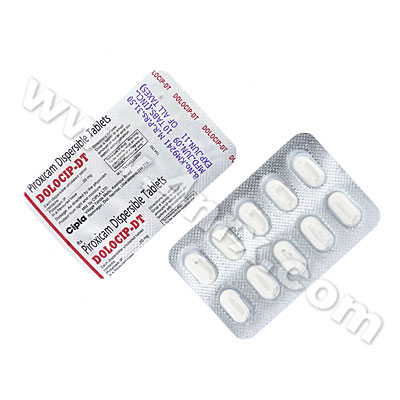 |
Home  Arthritis Arthritis  Dolocip-DT (Piroxicam IP) Dolocip-DT (Piroxicam IP) |
|
|||||||||
|
Dolocip-DT (Piroxicam IP)
What is Dolocip-DT (Piroxicam IP) used for? Dolocip-DT (Piroxicam IP) is a type of nonsteroidal anti-inflammatory drug (NSAID) that is used to treat pain or inflammation caused by conditions such as arthritis, primary dysmenorrhea, and post operation pain. It also has analgesic properties. This drug works by inhibiting the body's production of certain substances which cause inflammation to occur. How should I use Dolocip-DT (Piroxicam IP)? Dolocip-DT (Piroxicam IP) tablets should be taken orally with a full glass of water. Adults are sometimes directed to take this medication once or twice per day, however the exact dosage varies for each patient, depending on the condition being treated. Patients should always consult their physician before taking this drug so that the correct dosage can be prescribed. Patients should note that it may take 8 to 12 weeks for the full benefits of this drug to be noticed. Always follow the instructions of your physician. What are the side effects of Dolocip-DT (Piroxicam IP)? Patients may notice some side effects when taking Dolocip-DT (Piroxicam IP), such as:
You should consult your physician immediately if any of these side effects persist or worsen, or if you notice other more serious side effects, such as unusual bruising, changes in mood or behavior, swollen limbs, stiff neck, dark colored urine, severe nausea or yellowing of the eyes or skin. Please Note Strictly follow all instructions provided to you by your physician or pharmacist while using Dolocip-DT (Piroxicam IP). Optimum and safe dosage can differ based on the patient and the condition being treated. As this medication may be unsafe for certain patients, it is essential you always inform your physician if you are pregnant or breastfeeding, as well as if you have any allergies, other illnesses, or ongoing health conditions, and if you are taking any other form of medication, supplements, or herbal products. Patients should be aware that this drug may sometimes cause stomach bleeding. Patients who use tobacco products or consume alcoholic beverages daily are at an increased risk of this occurring. In order to minimize the risk of stomach bleeding, patients are advised to limit their consumption of alcohol and to stop smoking. Immediately seek emergency medical care if you have any allergic or hypersensitive reaction. Common signs of a reaction include hives, swelling, skin rashes, chest pains, as well as trouble breathing or swallowing. 
|
|||||||||||||||||